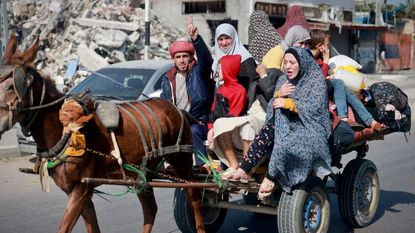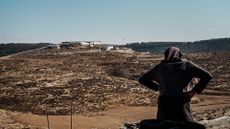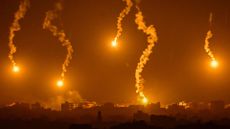Why Palestinians aren't fleeing Gaza during Israel's bombardment
Israel has urged Palestinians to evacuate northern Gaza as it fights to destroy Hamas, but lots of Palestinians are staying put


Israel's military has cut the Gaza Strip into northern and southern halves as it surrounds Gaza City and other northern parts of the Palestinian enclave in its campaign to destroy Hamas. The Israel Defense Forces (IDF) continue to bomb dense urban areas in northern Gaza — apparent airstrikes hit the Al Maghazi community early Sunday and the IDF flattened part of another former refugee camp, Jabaliya, on Oct. 31, killing dozens of civilians and wounding hundreds, according to the Gazan Health Ministry.
The health ministry, part of Gaza's Hamas-led government, said more than 10,000 Palestinians have died since Israel launched its war in response to Hamas' Oct. 7 attack on civilians in southern Israel. The World Health Organization said Sunday that between bomb damage and dire shortages of fuel and supplies, 14 Gaza hospitals are no longer operating. Israel says Hamas has built underground command centers beneath hospitals as part of its strategy of hiding behind civilians.
Israel also insists it is trying to minimize civilian casualties and points out that it has urged Palestinians to evacuate to southern Gaza for weeks, using millions of dropped pamphlets, text messages and robocalls to warn civilians there are no safe places around Gaza City. The IDF said it halted its bombardment for several hours each day over the weekend to allow civilians safe passage south along the main highway. "Not only are we telling them where to go, but we're also helping and creating much better humanitarian conditions in the south," Lt. Col. Jonathan Conricus told CNN late Sunday.
Subscribe to The Week
Escape your echo chamber. Get the facts behind the news, plus analysis from multiple perspectives.

Sign up for The Week's Free Newsletters
From our morning news briefing to a weekly Good News Newsletter, get the best of The Week delivered directly to your inbox.
From our morning news briefing to a weekly Good News Newsletter, get the best of The Week delivered directly to your inbox.
Lots of civilians remain in the north.
Why aren't Palestinians evacuating to southern Gaza?
Palestinians who have been able to travel south say it's not much better there, nor is it safe from Israeli bombs.
Israel has allowed dozens of trucks to deliver food, medicine, and water through Gaza's southern Rafah border crossing with Egypt, though Palestinians and international aid groups say the deliveries are sorely inadequate to address the growing humanitarian crisis. Hospitals up north say they can't evacuate unstable patients or infants in incubators, or abandon the hundreds of civilians seeking safety in the hospital. The United Nations says there's no room in its shelters in the south and evacuees are sleeping on the streets outside.
A Palestinian correspondent told the Los Angeles Times that he took his family from Gaza City south after the bombing got intense, returned north because the conditions there "were so bad, it was bahdala — a humiliating mess," with no water, electricity or hygiene at the overcrowded shelters — then fled south again, only to find that nobody would rent to northerners out of fear it would put an IDF target on their apartment.
Some would-be evacuees said the trip south is too hard due to the lack of fuel or too dangerous. "I want to leave but I don't want to lose my life on the way," Gaza City resident Ahmed Ferwana, 63, told The New York Times by phone. "It's better to die at home than to die in the street." The IDF says Hamas is preventing Gazans from traveling south.
Can Palestinians evacuate the Gaza Strip?
Egypt is allowing some injured Palestinians through the Rafah crossing, and foreign nationals or people with dual citizenship are being let out, but otherwise, Gaza residents are trapped inside the coastal enclave.
And hanging over everything is what Palestinians call the "Nakba," or the mass expulsion of some 700,000 Palestinians from their homes in 1948, during the creation of Israel, as political scientist Farid Abdel-Nour explained to The Washington Post.
Lots of Palestinians say they fear if they leave their homes in northern Gaza, or even southern Gaza, they will never be allowed back. Israel fueled those fears with an Oct. 13 Intelligence Ministry report that proposed transferring the Gaza Strip's 2.3 million Palestinians to Egypt's Sinai peninsula, The Associated Press reported. Israel's government downplayed the report as a "concept paper" from a junior ministry, but it is also privately promoting the idea to foreign governments, the Times reported. Certainly, Palestinians and Egypt's president are taking the risk seriously.
"We are against transfer to any place, in any form, and we consider it a red line that we will not allow to be crossed," said Nabil Abu Rudeineh, spokesman for Palestinian President Mahmoud Abbas. "What happened in 1948 will not be allowed to happen again." Egyptian President Abdel Fattah el-Sisi and President Joe Biden agreed to commit to "ensuring that Palestinians in Gaza are not displaced to Egypt or any other nation," Biden said on Oct. 29.

Continue reading for free
We hope you're enjoying The Week's refreshingly open-minded journalism.
Subscribed to The Week? Register your account with the same email as your subscription.
Sign up to our 10 Things You Need to Know Today newsletter
A free daily digest of the biggest news stories of the day - and the best features from our website
Peter has worked as a news and culture writer and editor at The Week since the site's launch in 2008. He covers politics, world affairs, religion and cultural currents. His journalism career began as a copy editor at a financial newswire and has included editorial positions at The New York Times Magazine, Facts on File, and Oregon State University.
-
 Today's political cartoons - December 2, 2023
Today's political cartoons - December 2, 2023Cartoons Saturday's cartoons - governors go Gotham, A.I. goes to the office party, and more
By The Week US Published
-
 10 things you need to know today: December 2, 2023
10 things you need to know today: December 2, 2023Daily Briefing Death toll climbs in Gaza as airstrikes intensify, George Santos expelled from the House of Representatives, and more
By Justin Klawans, The Week US Published
-
 5 hilarious cartoons about the George Santos expulsion vote
5 hilarious cartoons about the George Santos expulsion voteCartoons Artists take on Santa versus Santos, his X account, and more
By The Week US Published
-
 Israel reportedly had actual Hamas attack plan a year before Oct. 7 assault
Israel reportedly had actual Hamas attack plan a year before Oct. 7 assaultSpeed Read Israeli officials considered the intercepted battle plan too ambitious and out of step with their view that Hamas didn't want a war with Israel, documents show
By Peter Weber, The Week US Published
-
 Israel plans next phase of Gaza war as first hostages released
Israel plans next phase of Gaza war as first hostages releasedSpeed read After four-day ceasefire 'we will not stop' until destruction of Hamas, says Israel
By Harriet Marsden, The Week UK Published
-
 Is history repeating itself in Darfur?
Is history repeating itself in Darfur?Today's Big Question Escalation of violence, alleged atrocities and ethnic cleansing in civil war raise fears of genocide akin to 2003
By Harriet Marsden, The Week UK Published
-
 Gaza's Al-Shifa hospital battle: a 'diplomatic failure' for Israel
Gaza's Al-Shifa hospital battle: a 'diplomatic failure' for IsraelTalking Point Window to defeat Hamas is 'closing', warns former Israeli PM, as hospital scenes swing public opinion
By Elliott Goat, The Week UK Published
-
 How war in Gaza is impacting the West Bank
How war in Gaza is impacting the West BankThe Explainer Settler violence against Palestinians surges since 7 October attack in attempt 'to redraw the demographic map'
By The Week UK Published
-
 Ukraine's counteroffensive: has it failed?
Ukraine's counteroffensive: has it failed?Talking Point Russia-Ukraine war has entered period of 'static, attritional warfare'
By The Week UK Published
-
 Why is the US arming Taiwan?
Why is the US arming Taiwan?Today's Big Question Washington approves millions in arms packages to protect diplomatic ally, despite fury from China
By Harriet Marsden, The Week UK Published
-
 Israel says Gaza split in two in 'significant stage' of war against Hamas
Israel says Gaza split in two in 'significant stage' of war against HamasSpeed Read Troops expected to enter Gaza City within 48 hours as US secretary of state continues 'diplomatic shuttle'
By The Week UK Published










